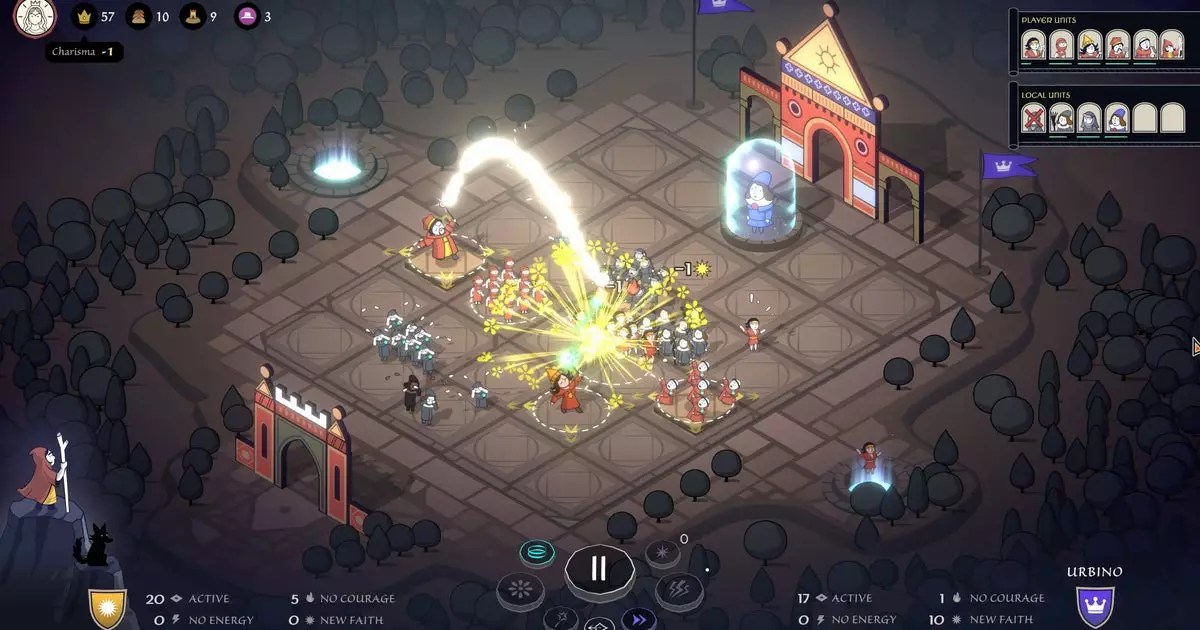In a gaming landscape flooded with conventional titles, “Becoming Saint” emerges as a bold testament to the art of storytelling within interactive entertainment. Launched into the rogue-like genre, the game thrives on absurdity and humor, inviting players to embrace an unconventional path to sainthood. The very premise positions you as a preachy protagonist navigating the turbulent waters of 14th-century Italy—a setting ripe for chaos, comedy, and richly layered character development. This peculiar mix sets the stage for a whimsical exploration of faith, politics, and allegorical absurdities that may leave a mixed bag of impressions, especially for more traditional gamers.
The game’s prologue introduces an intriguing premise where your character’s unfortunate fate beckons you to the world of purgatory with an outlandish twist. Caught in a web of missteps and misjudgments, including a snub to religious piety and a charmingly misguided political stance, players are challenged to accumulate believers from various social classes to ascend to the esteemed title of a Saint. The incorporation of self-irony through humor, particularly with references to credit cards in a historical context, paints the game as a satire—a pulpy yet engaging narrative that some might find disconcerting, while others delight in the wry humor of the absurd caricature of religious life.
Gameplay Mechanics: A Dance of Strategy and Serendipity
As players embark on this zany journey, the underlying mechanics of “Becoming Saint” invite analysis. It employs a grid-based real-time strategy system, essentially merging religious rhetoric with tactical warfare. The philosophical might of preaching collides with the practical need for resources, mirroring the tension between divine aspiration and earthly sustenance. Each choice shapes your army of believers, encouraging experimentation with varied tactics while enriching the gameplay experience with layers of complexity.
The beauty of the game lies in its dynamic social commentary facilitated by in-game decisions. Your initial choices—embodying the characteristics of your animal emblem, for example—dictate how your narrative unfolds. By favoring a majestic wolf, players find themselves fighting against the tide of capitalism. This relativity of ideologies becomes palpable as you traverse through towns, gather followers, and face confrontations with rival zealots. The ebb and flow of affection from your believers might seem quirky, yet it serves as a reflection of the complexities of human faith.
Visual and Artistic Inspiration: A Tactile Experience
Not to be overlooked is the visual presentation, which captivates with its charming aesthetics reminiscent of pop-up cardboard towns. This choice of design, coupled with Kate Beaton-esque illustrations, creates a distinctive atmosphere that evokes nostalgia while simultaneously inviting players into a vibrant medieval world brimming with cheeky humor. The juxtaposition of medieval iconography with contemporary gameplay elements not only enhances engagement but also encourages a sense of whimsy.
The presentation itself feels vital, as if the developers at Open Lab Games understood that players should not merely observe a narrative but should step into it, feel its contours, and interact with its fabric. The sepia-toned parchment scrolls of menus and the interactive narrative mimicking a choose-your-own-adventure format foster an immersive experience driving players deeper into this delightful chaos.
The Power of Belief in the Game
Amidst the humor and whimsical appeal, “Becoming Saint” doesn’t shy away from addressing profound themes—faith, belief, and the often paradoxical nature of religion. Your interactions with townspeople translate into fervent battles for hearts and minds. The RT strategy combats symbolize more than mere gameplay; they encapsulate the essence of persuasion, a skill as old as humankind.
As you navigate the treacherous landscape of faith, choices become pivotal—not just for immediate gameplay but for engaging with larger societal questions. How flexible are your moral compasses? How do they resonate with the belief systems of various social classes depicted within the game? This delicate layering offers immense replayability, urging players to explore differing strategies and approaches in their quest for sanctity.
“Becoming Saint” is more than just a modern roguelike; it stands as a satirical torchbearer, illuminating the quirks of human belief while spinning players into an extravaganza of grotesque yet joyous comedy. In a world where the search for meaning intertwines humorously with the absurd, perhaps our journey toward sainthood is as convoluted as it is enlightening, challenging us to question the very constructs of faith we hold dear.


Leave a Reply